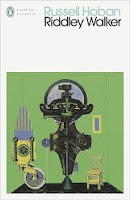It is the dismay of people learning the English language everywhere to discover the fact that they must, in fact, learn two languages: the signed (written) and spoken (verbal). For whatever reason, we have 'to', 'two', and 'too' while writing, but pronounce all the same. There are few other languages for whom spelling bees are as dynamic. Literally embracing this fact to tell of a post-apocalyptic future is Russell Hoban's brilliant 1980 Riddley Walker.
Riddley Walker is set an unknown amount of time in a post-nuclear future of England. Shit hit the fan, and the bombs went off. Enter young Riddley Walker. Son of the group's soothsayer, he faces tragedy early when his father is crushed while excavating a large machine from the mud. But more ominous omens occur, including Riddley being attacked by a pack of dogs. He is forced out of the group and into the wilds. Journeying the ravaged, primitive lands, he runs into all manner of people, trying discover a new place for himself.




